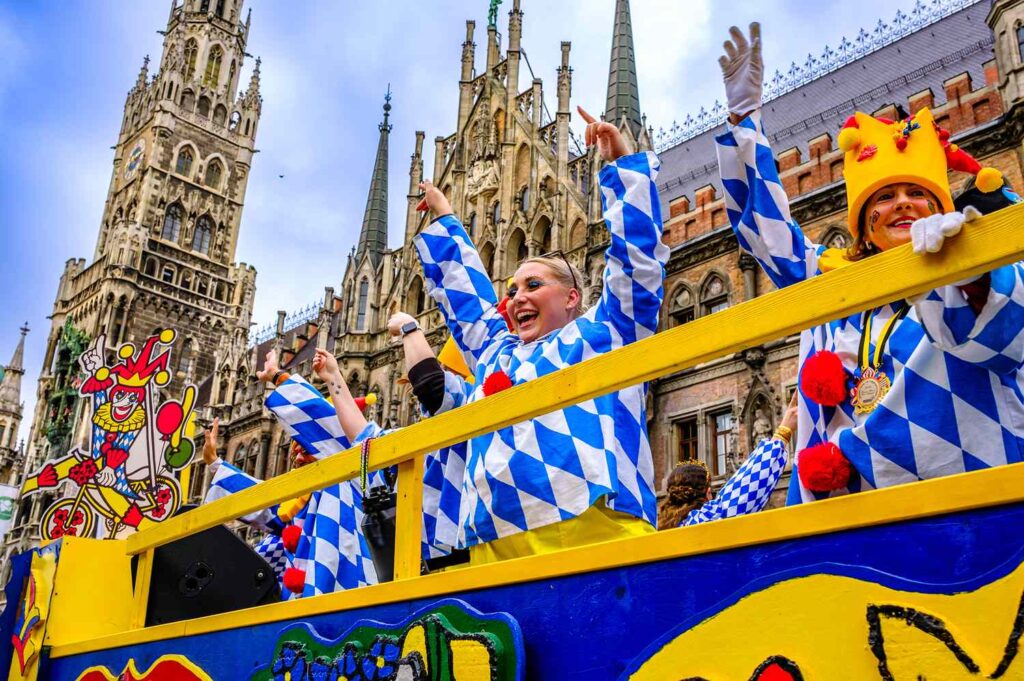If there’s one festival people associate with Germany, it’s Munich’s Oktoberfest, an annual event of beer, bratwurst, and Schlager music that overtakes the city every September. The tradition will celebrate its 190th edition this year, kicking off on Sept. 20 with a procession of beer to Theresienwiese, the grounds where the inaugural barrel is tapped to mark the festival’s official start.
Aside from the six million people who attend Oktoberfest annually, many Germans (and foreign residents of Germany, like me) strategically avoid Munich during this 16-day period to dodge the large crowds. If you fall into this category, or you’re simply looking for alternative cultural celebrations in the Bavarian capital, read on for five lesser-known festivals in Munich worth planning a trip around.
Bachfest (November 2025)
No visit to Germany is complete without paying homage to one of the composers responsible for the country’s musical legacy. The 100-year-old Bachfest travels to a different city every year, with Munich hosting the centennial occasion this November. The festival brings together daily classical performances throughout the month, with art and events celebrating the musician and his legacy. From church choirs to orchestras to organ solos, venues across the city ring out the greatest hits on all instruments.
Although the composer was neither born nor buried in Munich, the city has a special history with him. Munich’s own Karl Richter, a conductor and organist working after World War II, repopularized Bach’s music for decades, turning the city into a “Bach Metropolis” and making it a frequent site for festivals featuring the composer’s music, including the official Bachfest. Some events require advance tickets, though many are free. Check out the Bachfest program for more information.
Tollwood Festival (July and December)
Michael Nguyen/Getty Images
Celebrating international culture with open-air art exhibits, workshops, theater, music, and food, Tollwood is Munich’s festival of “courage and action,” a motto that encourages an open-minded, ecological outlook in what the organizers call the “Market of Ideas.” Bringing together international arts and entertainers with a focus on environmental well-being, the festival has been running since 1988.
It takes place twice a year, in July and December. During the summer, it’s hosted in Olympiapark, the city’s Olympic stadium built for Munich’s 1972 games; in the winter, it can be found on the Oktoberfest grounds of Theresienwiese, complete with a Christmas market twist. While the market and food stalls offer products for sale, most art and entertainment events are free.
Munich Creative Business Week (May)
Munich is home to several design-centric universities, as well as the design and architecture collections of the Pinakothek der Moderne, so it’s no surprise it plays host to Munich Creative Business Week, Germany’s largest conference of its kind, welcoming 65,000 professionals from the design world to inspire each other and reveal new ideas. MCBW brings together technology, art, and design for a festival that’s worth the travel arrangements.
Filmfest München (June and July)
Felix Hörhager/Getty Images
Locally born and internationally accessible, the Munich International Film Festival showcases the best of new German film and television, iconic classics, and international movies that may have premiered at industry-only festivals. Besides the internationally recognized Berlinale, it’s the most well-attended festival for German industry folks and stars, so you’re likely to spot European celebs on the red carpet.
And it’s accessible to movie fans and international visitors, too. Films are subtitled in English and tickets can be purchased for individual screenings or, at a reduced rate, in packages of five, 10, or 20. Best of all? The festival takes place at the end of June, when Munich’s famous Englischer Garten, the largest inner city park in the world, is in full bloom.
Fasching (February)
FooTToo/Getty Images
The colorful pagan festivities that have come to be celebrated in the weeks leading up to the Lenten season have different names across the world: Mardi Gras in New Orleans, Carnival in Rio de Janeiro, and Fasching in Munich. Cologne’s Karneval is the most well-attended event of its kind in Germany, so Munich offers a slightly quieter (but still exciting) alternative.
Over the final weekend before Ash Wednesday, the city casts off the darkness of wintertime with open-air parades and street festivities. Participants in handmade masks and funky costumes take over Munich’s pedestrian zone and the Viktualienmarkt to celebrate the occasion.
If you’re not around for this party weekend, you can find hundreds of formal Fasching Balls throughout the month at opera houses, theaters, hotels, and other venues around the city. These events have costume themes or black-tie dress codes, so make sure to check the venue’s requirements and book a place ahead of time.
https://www.travelandleisure.com/festivals-events-in-munich-beyond-oktoberfest-11774016


